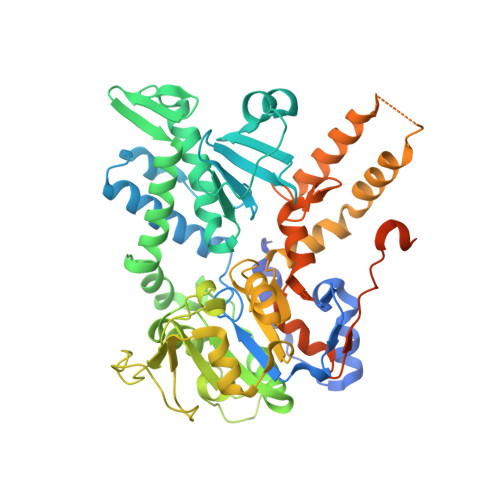Oligomeric interface modulation causes misregulation of purine 5 -nucleotidase in relapsed leukemia.
Hnizda, A., Skerlova, J., Fabry, M., Pachl, P., Sinalova, M., Vrzal, L., Man, P., Novak, P., Rezacova, P., Veverka, V.(2016) BMC Biol 14: 91-91
- PubMed: 27756303
- DOI: https://doi.org/10.1186/s12915-016-0313-y
- Primary Citation of Related Structures:
5K7Y, 5L4Z, 5L50 - PubMed Abstract:
Relapsed acute lymphoblastic leukemia (ALL) is one of the main causes of mortality in childhood malignancies. Previous genetic studies demonstrated that chemoresistant ALL is driven by activating mutations in NT5C2, the gene encoding cytosolic 5´-nucleotidase (cN-II). However, molecular mechanisms underlying this hyperactivation are still unknown. Here, we present kinetic and structural properties of cN-II variants that represent 75 % of mutated alleles in patients who experience relapsed ALL (R367Q, R238W and L375F). Enzyme kinetics measurements revealed that the mutants are consitutively active without need for allosteric activators. This shows that hyperactivity is not caused by a direct catalytic effect but rather by misregulation of cN-II. X-ray crystallography combined with mass spectrometry-based techniques demonstrated that this misregulation is driven by structural modulation of the oligomeric interface within the cN-II homotetrameric assembly. These specific conformational changes are shared between the studied variants, despite the relatively random spatial distribution of the mutations. These findings define a common molecular mechanism for cN-II hyperactivity, which provides a solid basis for targeted therapy of leukemia. Our study highlights the cN-II oligomerization interface as an attractive pharmacological target.
Organizational Affiliation:
Institute of Organic Chemistry and Biochemistry, Academy of Sciences of the Czech Republic, Flemingovo nam. 2, Prague 6, 166 10, Czech Republic. hnizda@uochb.cas.cz.















